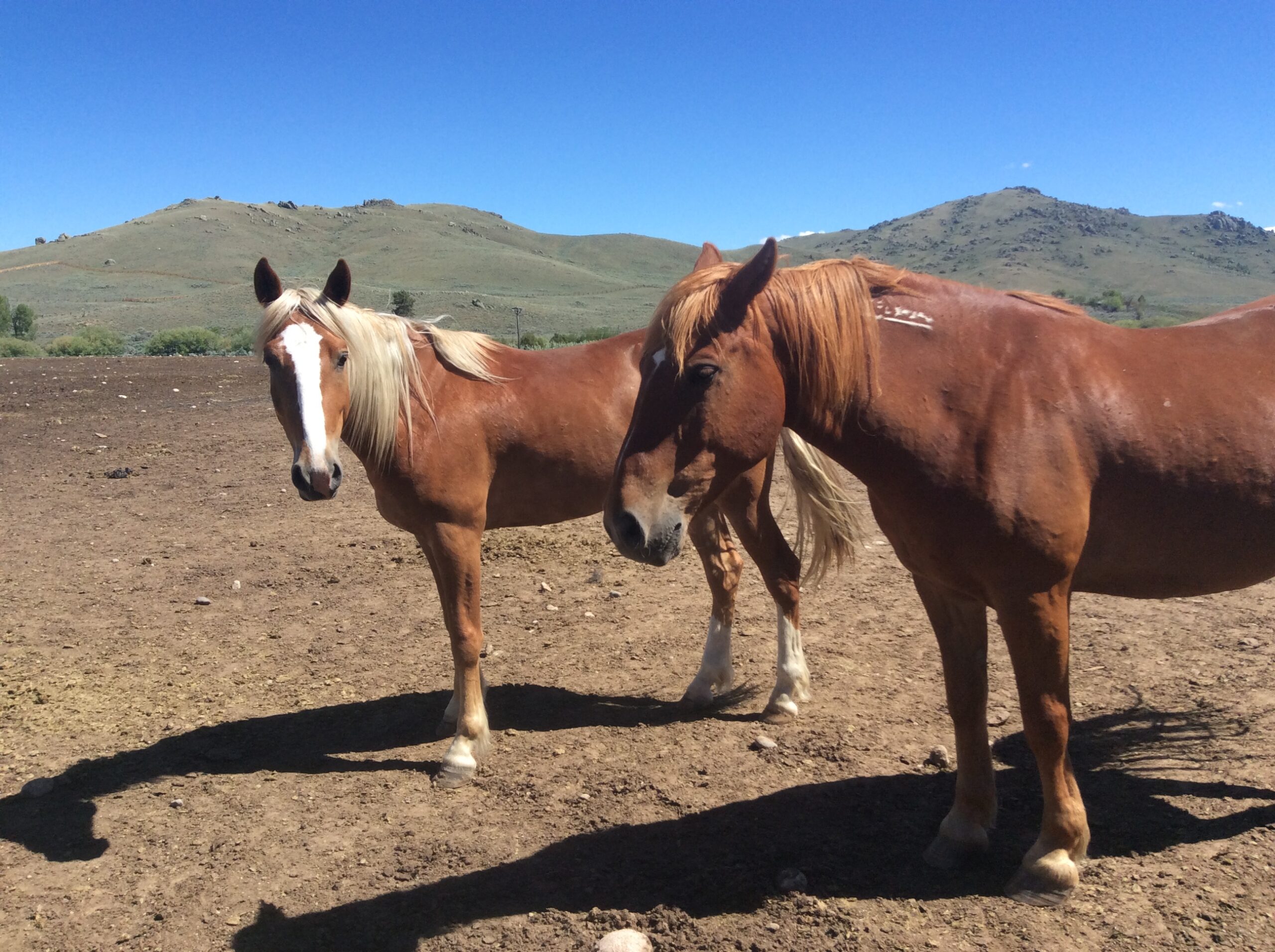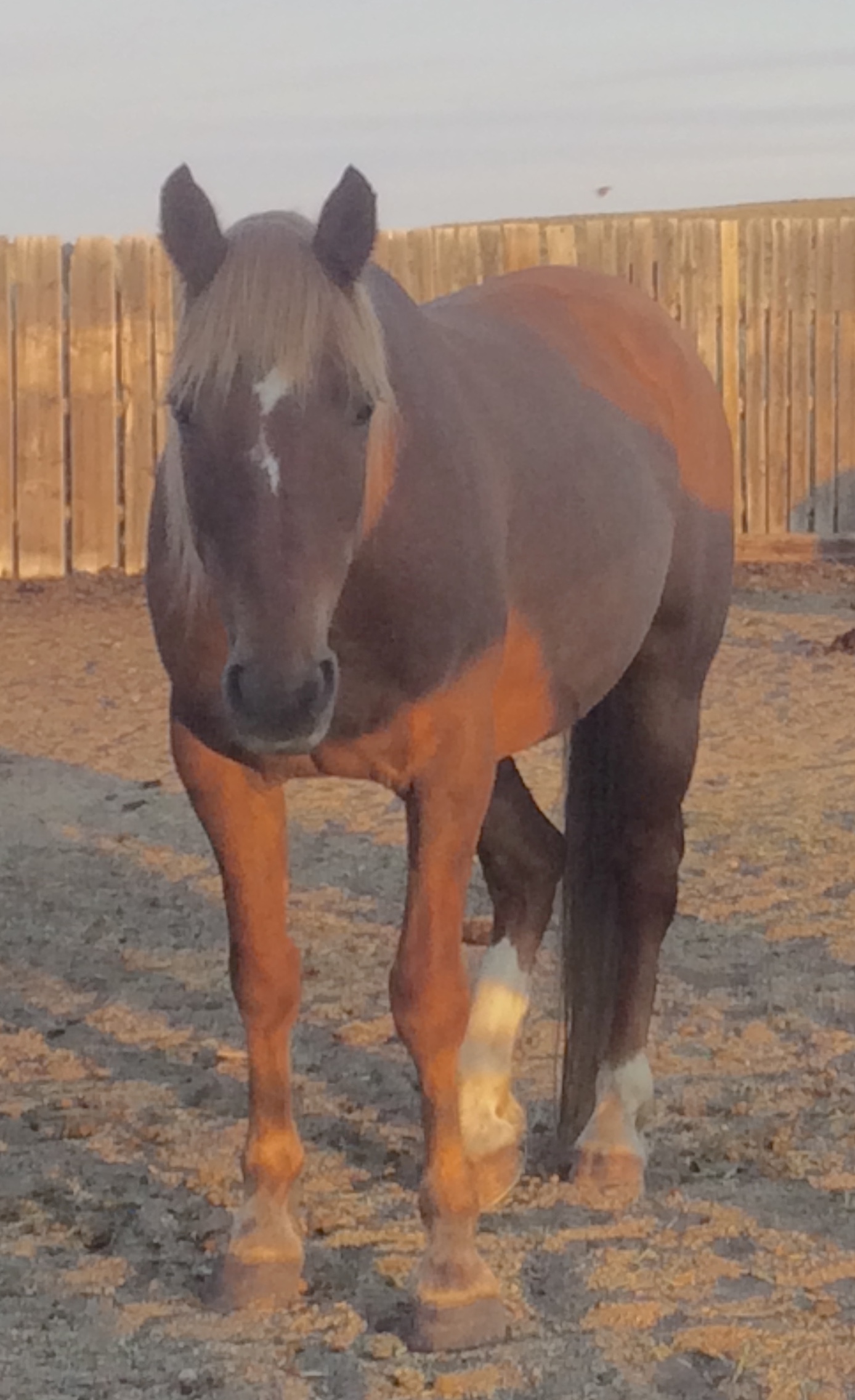It’s all the same, only the names will change. . .*
Under towering cumulus congestus a game of cat and mouse, horse and (want to be) rider, catch me if you can, played out among the herd of Three Peaks horses. This time, there was three of us. Mauricio, Fiona, and myself all worked to catch Sarsaparilla as she deftly out maneuvered us, eventually winning the persistence game. Two years after I wrote the piece below, the game is the same, only the names have changed. . .
Spring 2020: “It’s ok to be loved, Doug.” His tongue moves in and out, his lips up and down. They quiver with a quickness. I scratch his neck, pushing his blonde mane aside to see the freeze brand of white hair scripted on to his liver chestnut coat. “You are safe, you don’t need to eat with an eye on the horizon, you don’t need to run from me.” Doug though, is known for nothing other than being hard to catch.
Doug was born in the wild, on the high desert of Wyoming. Maybe that is why he [sleeps with his pants on] and eats with one eye watching, unsettled, never at ease. Always ready to go, always aware, able to move and evade with quickness and determination. Doug is a mustang, a category of horse that are ferrel, born free. Doug sleeps with his pants on. He sleeps with one eye open. Born wild, the instinct to survive is there. Remnants of the lost and abandoned horses of the genocidal armies of the republics, both Spanish and U.S., they roam in herds across the sagebrush plains of the western United Sates. As range conditions dictate, the BLM rounds them up, and tries to auction them off. Unlike Doug, I wasn’t born wild; I was raised with care and love. Not dissimilar to Doug though, I still sleep in my pants.
One of my earliest memories of Doug was from the mountains. In a herd of twenty horses Doug was always the hardest to catch. Ari or Liz would be out in the meadows on the cool September mornings, frost dripping off yellow leaved willows, steam rising from a lazy, rocky creek, playing a game of cat and mouse in the morning sun. Halter in one hand, they would use pressure and release to slowly coax him to a standstill and into the halter. Sometimes the most effective pressure was his herd instinct: catch the rest of the horses, then he would follow.
In the ensuing years, not much had changed. Doug, when taken on re-rations, usually means an early morning game of “catch” in the corrals, sometimes in the pink sky, pre-dawn dusk, other times in the dark of an early fall morning. He wasn’t always the most elusive, he just wasn’t a wild card; Doug was dependably elusive.
I didn’t plan to spend this spring, or the summer with Doug at his home on Three Peaks Ranch, but not much went according to plan in the early half of 2020. As the the novel coronavirus upended my employer, I adapted and swerved; l too ate with an eye on the horizon. I slept with my pants on, ready to go at any moment. The coronavirus played to my strengths. As my co-worker and I settled into the 120 acres of crunchy, brown pasture, dusty sage, and brittle, sunbaked buildings, I honed in on Doug and his difficulty to catch as a project. On the surface it seemed like a useful challenge; maybe somewhere deeper, unbeknownst at the moment, I felt a kindred spirit.
Horses are ingrained with the concept of pressure and release. We as humans often use this idea to help train a horse, getting it to do what we would like it to do. Pressure is applied in various ways: a predator or potential predator on the periphery of the herd, a strange object to the side of a trail, a flapping rain jacket, noise, a sudden movement, a squeeze of a rider’s thighs or tap of their heel, a cluck, a gaze or stare, etc. Often the idea in training a horse is to have the horse get used to a movement, an object, a sound, etc. When a highly responsive horse is tuned into a person, whether that person is on their back or on the ground, the horse responds quickly to the person’s gaze, gentle taps, sounds, or body language. While methods differ, with a horse in a controlled area (lead line from halter, round pen, etc) a person could engage a stimulus (waving a small flag on a stick, for example) to get the horse’s attention. As the horse begins to move quickly, the stimulus remains consistent and stays that way until the horse begins to slow then walk at an even clip around the person as the stimulus remains. Once the horse has walked a circle with the stimulus present, the person will often stop the stimulus and have the horse relax. The idea is that we want the horse to walk through the stimulus, not be afraid, and not just stand still. Another example would be standing with a haltered horse in an open area, with its lead line in the person’s hand, the person faces the horse, and then begins to look at the horses left hind quarters. A sensitive or attuned horse will often swing their hind quarters to the right. If the horse does not respond to the gaze, walking closer, spinning the tail of the lead line (like a propeller) in the direction of the hind quarters, and eventually applying light pressure with a finger or thumb, to applying heavier pressure (push, punch) will often get the horse to move. In this case, we want the horse to move with as little pressure as possible, which can indicate the horse understands what we are asking. Once the horse has responded, the pressure is quickly released.

So in trying to both catch Doug and make him less anxious about being caught, I tried engaging the concepts of pressure and release. It often went something like this: I wandered through the herd, touching all the horses, petting, remembering their names, hugging etc, all the while having one eye on the horizon, on the look out for Doug. He would often be the one moving when others just stood nonchalantly. Doug would already be feeling the pressure, regardless whether it was about him. Even if I was walking toward Squirt to give him his meds, Doug would tune in and move away. Once I made up my mind to engage Doug, I would move toward him at a walking pace. This frequently would cause Doug to light out for somewhere else. His peers would mostly stare blankly at his paranoia; sometimes they kicked at him and other times they played along. As Doug bolted, I would direct pressure (turn my body, look at, run along side) towards his shoulder. As long as he moved, I kept pressure there: sometimes from 30 meters away other times from 3 feet. If he paused and turned to face me, I would divert my gaze, slow my pace. and talk calmly. Frequently he would run circles around a small herd of horses, not wanting to go it alone in the several acre, dirt covered, lot. Other times we ran the dusty expanse together, just the two of us. He would seek out effective screens, hiding behind Tom or Wyatt, and often avoid walking himself into a corner. And eventually he would tire or space would trap him. I would slow, matching his pace, divert my gaze, talk calmly and engage his curiosity with a handful of grain the other horses around would eagerly want. One closed hand held the grain for the other horses, while an open hand held grain and reached out to Doug. He never moved forward, it would always be me moving closer. But he would stay put, then sniff the grain in my hand, and gum it up with his lips. And he wouldn’t let me touch him, other than the bottom of his chin as he ate from my hand. That process would take ten minutes. Or forty-five.
Doug and I would frequently engage in the mornings, in the soft, early light. Getting out, wandering through the herd as the sun began creeping its warmth down the ancient Wind River foothills and casting long shadows from short sagebrush, the cool dampness of the night’s dew lingering on the ground and in the air. I would slide into a layer, twist the knob and push the door open, stepping out onto the concrete entranceway, sliding my feet into the calf high rubber boots that stood patiently waiting to do their job. Mug of tea in hand, I would wander eastward, across gravel and dirt, through sage and rabbitbrush, shuffling toward the herd of horses, the steam of my mug mixing with the steam from the warming ground. I would sip and stroll, stroking, inspecting, and hugging my way through the herd. In return the long faces would inspect my mug. Once empty I would relegate it to a zipped pocket, then begin engaging Doug.
Over the weeks I kept trying to touch Doug. I was persistent. When he noted me and started to move the other direction, the game was on and I couldn’t leave until I won. Slowly, mostly by default, different variables were introduced: time of day, space to move, other horses, halter in hand, etc. Rarely was it the same, but somewhere along the line, something began to win out for me. Maybe it was love.
The dirt lot is large; sun baked mud and fine, dusty sediment cake the ground. In it fifty eight horses stood, idly, no where to go, nothing to do. That day I walked circles around Doug for 10 minutes. First wide then increasingly narrower. He paid no mind, not physically anyway. His head was down and he munched away at invisible flecks of hay scattered in the dirt. Time. I worked my way closer. Without hesitation, he let me in. I touched his face then walked off leaving him there licking his lips and chewing, not on the hay but on the thought.
Our two steel fenced corrals, condense the horses more than the expansive dirt lot. In the process of giving shots and dewormers, ease of access was important, so we pushed the horses into the two corrals, then one by one, pulled them out to put the paste in their mouth and inoculations in their neck. This day, halter in hand, Doug was evasive. The space though, played to my favor. He gauged my approach and deftly maneuvered, muscling around amongst the herd. Apple ran an effective screen and he added thirty more seconds to the game, but I walked him into a corner. Scared and skittish, he looked for a way out with no avail as Vega stuck his long, gray, bony head over my shoulder, seeking the grain in my hand. I draped the lead line over Doug’s head and held out my hand. His lips trembled as he picked the grain from my palm. I haltered him and offered another morsel before heading to the needles and dispensers.

That night, and for days after, we left Doug in the corral with Boots. He is calm and accepting and it leaves less space for him to run and no body to impress. Over and over again, I enter the corral, and walk toward him, halter in hand, grain in pocket. It gets easier, he thinks more. I show more affection. He has nothing else to focus on. I have no excuse not to engage.
Days later, we swapped Doug for Gus; Doug will overnight pasture with the herd and Gus, with open sores on his pasterns, will remain in the corral with Boots. I hopped the fence, halter clearly in hand and walked straight toward the liver chestnut. He stared, his mouth doing its thing. His wheels were turning. Unexpectedly he started toward me, as if happy to see me. Then, he juts left, veering off course slammed hard from the side by a thought of “this isn’t me, it isn’t my reputation.”
In the morning we let them in from evening on the pasture. They made their way, pounding hooves, rising dust, rippling muscles, into their daytime home. Many beelined to the water trough and loafing shed. McKenzie and I wandered through, touching, inspecting, and doting on the the horses. I spied Doug and we made eye contact. He backs away slightly; I hold out my hand. He starts moving toward me, knowing what he wants, but quickly jogs right when he realizes he doesn’t want to come toward me. I like to think I read his thoughts: “oh cool, I like that guy” and starts to move toward me, before remembering that it is not his MO to approach. He juts right and stops. His lips move, his tongue licks. He turns toward me.
I wandered out there in the afternoon, just before their thundering hooves would take them out dusty trails to lush green pastures and flowing waters. The sun was still high, and to the last, they stood still. Even Doug. I wasn’t prepared, but I engaged anyway. I leaned on the gate, talking, as if they understood (there really is no other way.) Doug watched me, safely from the other side of the fence. I made my way through the gate, turning the rusty ring and unclipping the carabiner and chain. Mentally, I had already engaged, made the decision, decided to try though I tried not to show him. I kept one eye on the horizon and engaged all but him, just wandered through, touching, talking, soaking up the physicality and affection of nuzzles and interest. But he knew, and he stayed. I played my game, slight pressure, slight release. He played his. But neither of us ran. I wrapped my arm around his neck, scratched his poll and the floppy cartilage of his crest. Then I walked away. And came back. And he moved. Toward me. And stood. I wrapped my arms and scratched him in the hard to scratch places.
The horizon ran long and far. It rolled with the cauliflower heads of sagebrush, air rippling in the late spring heat. Thunderheads built on the southern sky, but nothing was going to make it this far; nothing was going to quench the dusty thirst of hoof hammered ground. I inhaled, chest thrusting outward, gut inward, and let it all out in a lip vibrating sigh, mimicking the horses in my care. The loneliness of the landscapes echoed endlessly through empty insides. Years of anger, sadness, and heartbreak had carved them out, ridding myself of all that could nurture. They run deeper than I know. I looked up from his neck, wiping the tears from my eyes on his dusty, brown hair.
Tomorrow Doug will run from me, and in the ongoing game of pressure and release, I will follow. Tomorrow, the next day, or in two months, someone will run from me. In an ongoing game of pressure and release, I will follow. When they stop and engage, I will likely, much like Doug, turn and run. Unless I learn.
* with a nod towards Jon Bon Jovi and Richie Sambora
Featured Image: Three Peaks’ horses in the evening light.

Be First to Comment